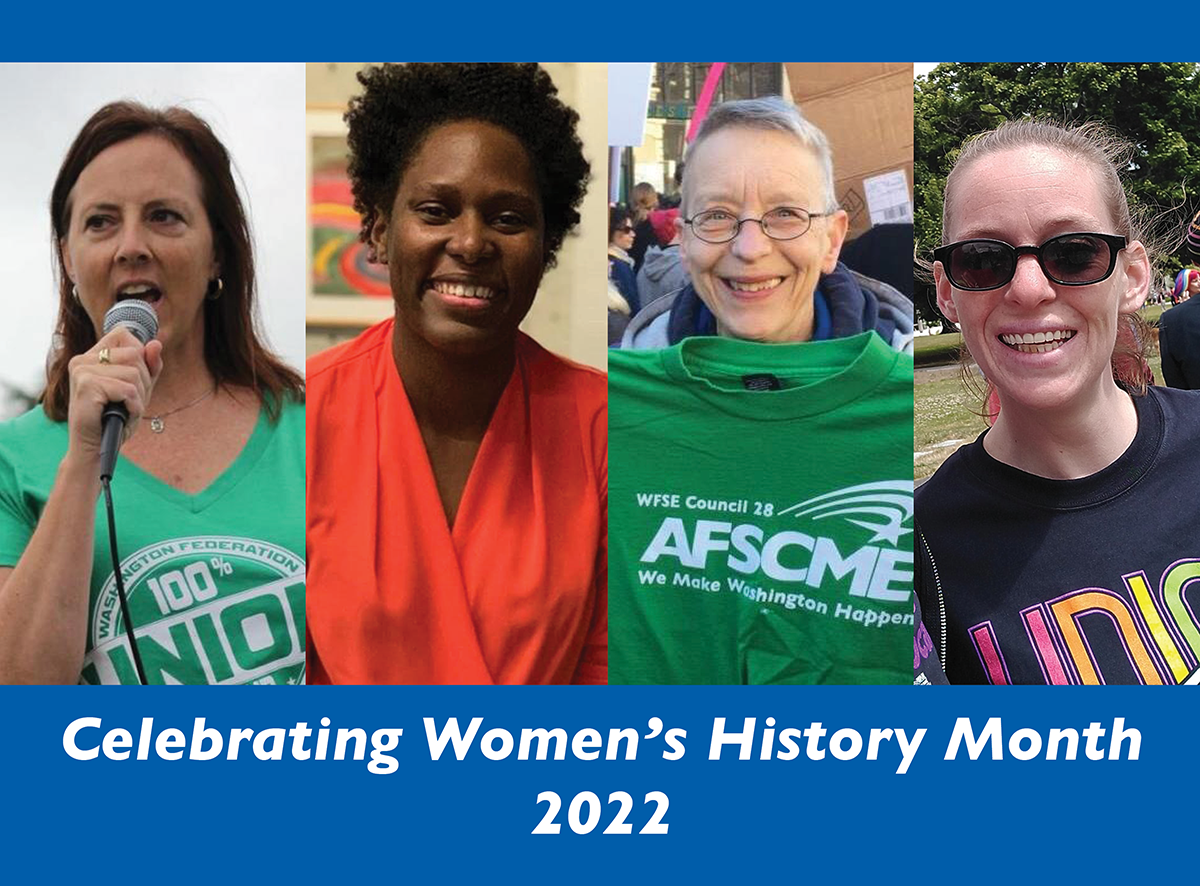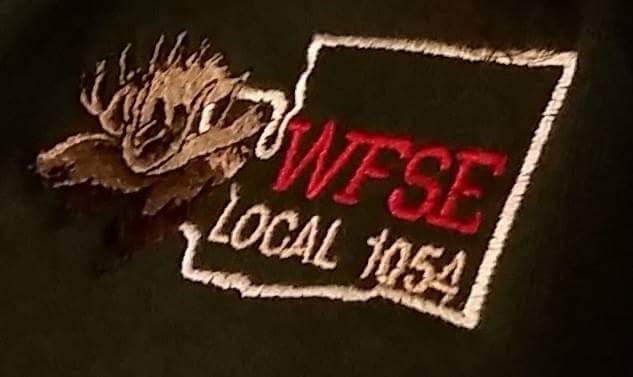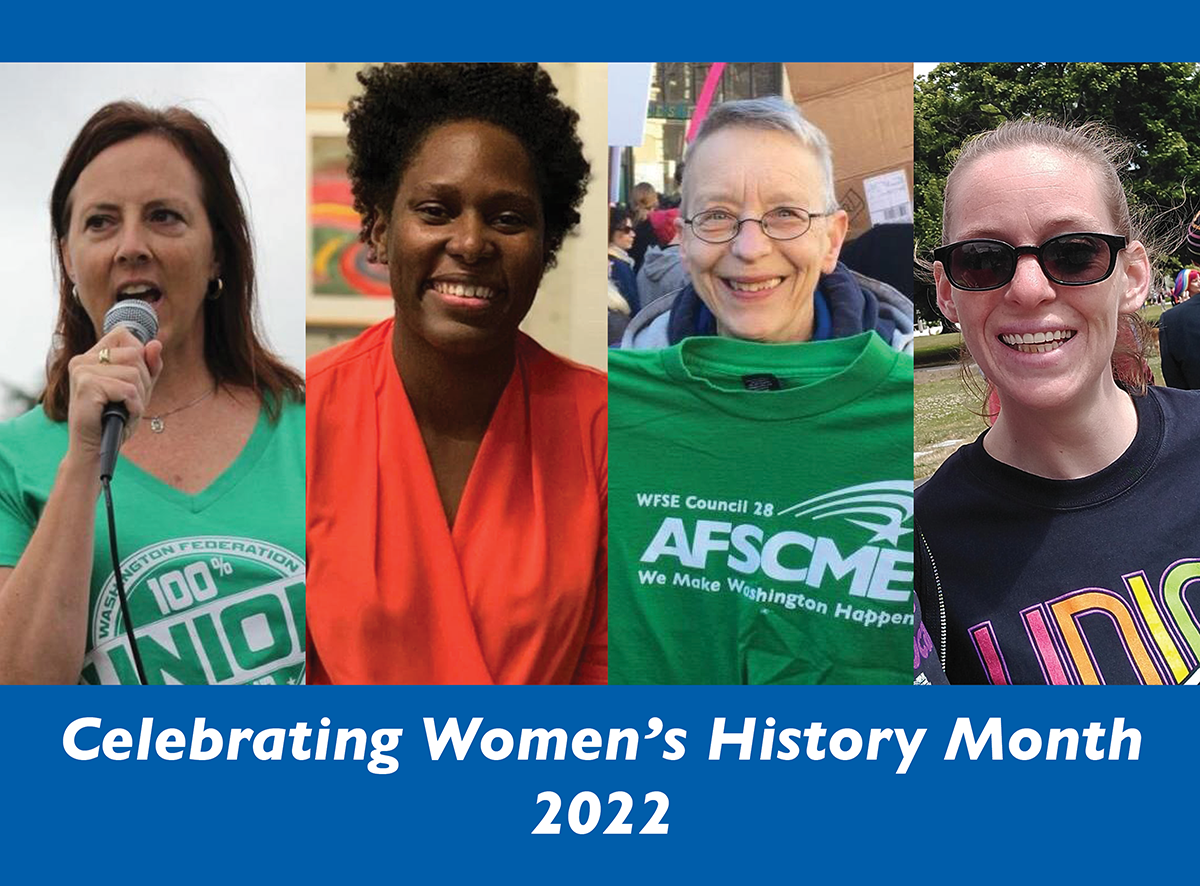Each year, Women’s History Month is a chance to thank and appreciate the many women in our movement who give their talent, time, and passion to lift up their union siblings.
We spoke with four women leaders in WFSE who exemplify the courage and solidarity that unionism is all about.
Leanne Kunze
“I have a low tolerance for injustice That’s why the labor movement has been a calling. It’s about advocacy and helping people find their voice.”
Leanne Kunze is WFSE’s first female executive director. She comes to the role with decades of public service, union leadership and firsthand experience breaking barriers.
Growing up in a working-class Catholic family in Minnesota, Kunze was taught the importance of caring for others, being civically engaged, and sticking to her values.
The first in her family to attend college, Kunze graduated from St. Catherine University in 1992.
At this all-women’s Catholic college, Kunze witnessed firsthand the difference between the words and the actions of Catholic teaching, admiring the bravery and persistence of the Sisters of St. Joseph of Carondelet who built, taught and mentored the students.
Soon she would step into an unexpected leadership role, one that would require integrity and courage.
“I became a single mom my sophomore year of college,” Kunze recalled.
“There were people who felt like I should have made a different choice,” she said. “Because of my Catholic upbringing, there was a lot of guilt.”
Despite the pressure, Kunze was determined to finish her degree. She was the first student allowed to live on campus while continuing her full-time studies as a young mother.
Today, St. Catherine has dedicated housing for student mothers—but Kunze had to invent her own support system living away from her extended family.
She relied on student loans and food assistance to remain on campus to support herself and her son. She also collaborated with fellow students - one in the nursing program, who provided childcare while gaining credit for hands-on care for a newborn.
Ultimately, Kunze’s hard work and courage in the face of judgment paid off.
“I graduated in three and a half years with a double major and a baby—and a minor in women’s studies,” Kunze said.
Kunze’s commitment to defying stereotypes and standing up for the underdog led her to a sixteen-year career in public service.
She worked as a deputy, licensed peace officer, and a social services specialist following her passion for helping families impacted by abuse and neglect.
“I learned the importance of listening for understanding. Even if terrible things are happening, with the right approach, we can find ways for that healing to happen,” she said.
Kunze was also an active union member, first with the Teamsters and then AFSCME Local 2789.
Eventually, she was recruited to a staff representative position with her union. Representing 17-25 local government contracts, she was responsible for everything from bargaining and training to arbitration.
Kunze’s work with her local union graduated to leadership roles with AFSCME Council 65 and the international union. Even now in her role as the first female executive director of WFSE, Kunze has never lost sight of what it’s like to be a member.
“I have a low tolerance for injustice,” Kunze said.
“That’s why the labor movement has been a calling. It’s about advocacy and helping people find their voice.”
Riley Ingram-Sowell
“For a lot of women who are marginalized, just their very existence is a revolutionary act."
Riley Ingram-Sowell is a Social Service Specialist, steward, WFSE DCYF Policy Committee delegate, and a member of the Local 843 Executive Board.
They were recently elected to serve on their bargaining team—a position they had not considered before their nomination.
“Having the support of other women when they found out about my nomination was what helped me to accept,” they said. “It really is an honor.”
Ingram-Sowell reflected on the power of mentorship and how the work of women leaders in their local has created space for their own journey as a union activist.
“I’ve been fortunate to have these positive experiences of women being incredible leaders for themselves and their communities,” they said.
“That has propelled me to want to do more and to feel that I’m capable of doing more.”
Like many public employees, Ingram-Sowell knows the importance of being vocal in the political processes that dictate wages and working conditions of public employees. They see powerful potential in building leaders from within unions to run for office.
“If you’re interested in running for office, you don’t have to do it alone,” Ingram-Sowell said.
“You have this whole support system.”
The more we can diversify our representation and bring voices into our political processes, the stronger we’ll be.
“We need more people running for these positions that affect not only our jobs but also our communities,” they said.
Ingram-Sowell takes inspiration from the diverse leadership in their union. There’s a sense of community, even when opinions differ.
“For a lot of women who are marginalized, just their very existence is a revolutionary act,” Ingram-Sowell said.
“What I’ve loved about this union and particularly my local is that there is diversity as far as all the people that come together—even if we don’t agree. It’s a lot of women of all races. We do a good job of making sure everyone’s voice gets heard.”
Paula Lukaszek
“I never thought I’d be involved in a union where there were so many women in leadership roles. Women are encouraged to get involved at WFSE."
Paula Lukaszek, a plumber and pipefitter at the University of Washington, is WFSE’s Treasurer and Local 1495 President. She has served as a steward, WFSE Executive Board member, University of Washington bargaining team member, and in many other union leadership roles.
Lukzaszek was an early pioneer in integrating women into trades jobs and unions.
From the beginning, she had an instinct for solidarity and working together with her coworkers—but she faced an uphill battle as a female building trades apprentice. At job sites, Lukaszek was harassed and told repeatedly, “you’re not welcome here.”
Lukaszek recalls joining her first building trades union in 1978.
“I started speaking up and bringing members’ concerns to the membership meetings,” Lukaszek said.
Lukaszek found herself unwelcome, even having to sneak into local meetings through the back door.
“At the time, they did not want any women in there,” Lukaszek said.
Despite this, she persevered, earning her journeyman license and working as a plumber and pipefitter.
In 2003, Lukaszek applied for a plumber position at UW. She was in for a surprise when she attended her first meeting as a new member of WFSE.
“I was used to being the only female at local meetings,” Lukaszek recalled.
Not only were there women in Lukaszek’s new local—the president at the time was a woman.
“I never thought I’d be involved in a union where there were so many women in leadership roles,” she said.
Lukaszek jumped into WFSE immediately. She was trained as a member action team leader, became a steward, and was elected to the executive board.
“Women are encouraged to get involved at WFSE,” Lukaszek said.
In her time in the labor movement, Lukaszek has seen times change. Now, building trades apprenticeship programs and trades unions understand they need to reach out to women, people of color, and other marginalized folks.
“I’m always trying to encourage people to get into the trades,” Lukaszek said.
“You get a lot of self-confidence, and you’re out here working with your hands, making a really good wage compared to a lot of other jobs out there. And for the most part they’re union, which is really important,” she said.
Today, Lukaszek is organizing with coworkers and local union siblings to advocate for training and materials in more languages and for free English classes.
“My local, 1495, is so diverse,” she said.
“Probably 60 percent of our members are women and 65 percent are people of color.”
Progress is slow, both on the job site and in the labor movement—but it’s happening.
“For the longest time it seemed like all unions representing low-wage workers were always headed by a male,” Lukaszek said.
“Now women are saying, ‘I think I could be president.’ They’re starting to get their members to realize, someone like me can get involved and can run our union, because we know what it’s like to work in this union.”
Ashley Fueston
“My leaders aren’t really your token leaders or the people in the news that you’re going to see. They’re people like the teachers who supported me and encouraged me, who pushed me outside my comfort zone but made me the woman I am today. Not leaders in title, but leaders in action.”
Ashley Fueston is serving her first term as WFSE’s Vice President. She has served in many union leadership roles, including as a steward, WFSE Policy Committee delegate, AFSCME Convention delegate, and bargaining team member.
Fueston has been an instructor with the Strategies for Success program at the Employment Security Department for three and a half years.
“Service has always been in my nature,” she said.
Fueston brings a sense of humility and kindness to her clients. She’s been in their shoes.
When facing difficult times, Fueston was able to find work as an Americorps volunteer in a WorkSource office.
“State employment was the natural next step based on the impact I had seen at the office,” Fueston said.
“People are always going to need work and they’re always going to need a team behind them. That’s what WorkSource does.”
Looking back on her path to union leadership, Fueston was inspired not by union presidents or famous politicians, but by the everyday women who saw the best in her and pushed her to do more than she thought she could.
“My leaders aren’t really your token leaders or the people in the news that you’re going to see,” Fueston said.
“They’re people like the teachers who supported me and encouraged me, who pushed me outside my comfort zone but made me the woman I am today. Not leaders in title, but leaders in action.”
This quiet but powerful leadership isn’t always easy to offer. Like many women in leadership roles, Fueston can’t help but see the many small and large instances of ingrained discrimination, like hearing her ideas gain recognition when restated by a man or seeing a look of surprise when a union sibling hears her mention her wife.
“Speaking as a lesbian female who has a wife and a family, when people find out about that, they’re a little bit surprised,” Fueston said.
“There are probably more women leaders in the movement that are part of the LBGTQ community than we know of.”
Still, Fueston’s showing up to make room for other women, LGBTQ people, and people of color. She wants to bring more folks into our union and movement.
It’s all about making space for more voices and experiences.
“We as women need to support our peers and make the space and say, ‘here it is, it’s yours,’ so they know they are welcome.


